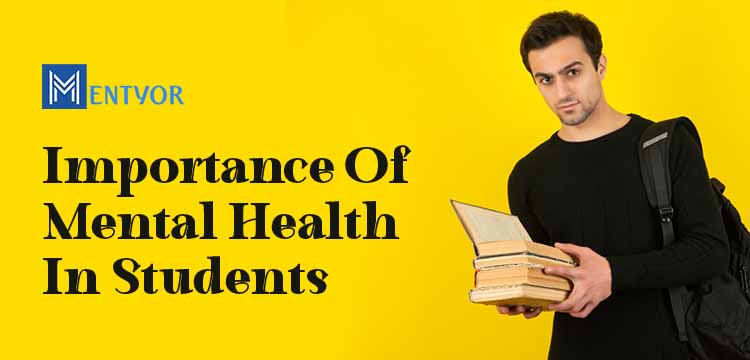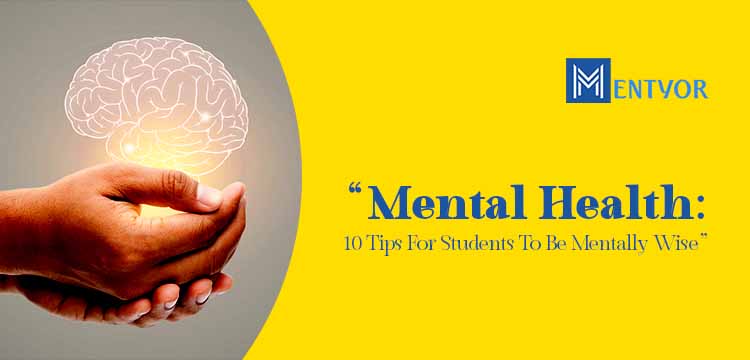Are you noticeable when you see your classmate sulking after a hard exam? Or have you felt the academic pressure taking a toll on your mental health? With an overwhelming curriculum and the race to be at the top, students are facing a grave mental health depreciation. Though they would not like to admit, their mental health is getting affected adversely as they try to rise and shine in academics.
Mental health issues in students have been rising due to various factors. It can either be academically related or socio-economic conditions or personal reasons. Nevertheless, the importance of mental health must be imparted. If educational institutions fail to do so, there are possible chances for the students to slip more into mental health issues.
Diving into promoting mental health awareness requires us to understand the concept of mental health as a priority. This will help us in knowing how the students feel, think, and act, both academically and towards mundane situations.
Mental Health: Understanding the Term Closely
In the crudest sense, mental health refers to how an individual thinks, feels, and acts. The American Psychology Association defines mental health as, “a state of mind characterized by emotional well-being, good behavioral adjustment, relative freedom from anxiety and disabling symptoms, and a capacity to establish constructive relationships and cope with the ordinary demands and stresses of life.” This implies that an individual is said to have stable mental health when he or she can adapt and adjust accordingly to changing situations.
Apart from the adjustment factor, mental health also includes self-efficiency and self-actualization. A person having mental awareness can make decisions and handle situations without assistance or minimal assistance. This makes him or her efficient in maintaining their mental well-being and solving problems expeditiously. A self-actualized person can prevent mental health depreciation by understanding their emotional and intellectual potentialities.
In recent times, with fast-paced lives, the importance of mental health has risen. There is an optimistic shift from perceiving mental health from amongst the stereotypes. People have considered the concept of mental health to be an exaggeration or a part of overthinking. However, with time, they have realized that mental health depreciation is real and requires support and treatment effectively.
Read our Blog about Homesickness Problems Tips for Students: Homesickness Problems Tips For Students
According to the World Health Organization,[1] lack of mental health awareness leads to growth in anxiety disorders, depressive personalities, and suicidal attempts. Particularly, suicides have become the second most common death reason for the age group of 15-29 years. Further, depression which is one of the main causes of suicides is found in 5% of the entire population. Other mental health issues and disorders like Bipolar disorder affect 45 million people worldwide.
The symptoms of these mental issues range from minor to major. The minor symptoms of mental disorders include the feeling of agitation, despair, hopelessness, and various other mood swings. If these symptoms remain unaddressed for a long time, they develop into major ones. This includes extreme mood swings, strong expressions of emotions, insomnia, social withdrawal, and others.
Importance Of Mental Health In Students | Mentally Wise

The academic lives of students run between stress and anxious corridors. Covering up the syllabus, performing well in exams, and being updated becomes a hard task for students. It has put both the school and college students under a stiff belt of academics. According to a survey by the American College Health Association in 2015, 30% of students were suffering from stress [2]. 22% of the students suffered from anxiousness and 34% suffered from sleep deprivation and depressive thoughts.
Today, with the uncertain shifts due to the pandemic, students have been affected majorly. Shutting out of schools into respective homes has curbed the highlighting instinct of the students, that is interaction. The students have no more interaction which majorly takes place at schools, colleges, and universities. As per the survey conducted [3] by The Ohio State University, students have been experiencing rising rates of stress, anxiety, and ‘unhealthy coping mechanisms’ due to lack of being at school involved in interactions. These mental issues have also withdrawn them from their surroundings and pushed them into laziness.
Read our blog about 6 Stress Busters for College Students: 6 Best Stress Buster For College Students
The importance of mental health [4] in students is a crucial role player. Keeping the students knowledgeable about mental awareness will assist them positively. The prominent reasons why imparting about mental health in students is needed are:
- To make sure of early detection of mental health issues and treat them accordingly.
- To know what the students are feeling, and going through regarding different subjects
- To understand how the students are dealing and juggling between academics and other affairs.
- To help the students realize what the problems are and how they are experiencing them.
- To help the students in opening up if they are going through any mental constraints.
- To help the parents, teachers or guardians detect the behavioral change and assist the students accordingly.
- To educate the child about the possible help and therapies they can access at schools or their educational institutions.
These are the reasons why mental health must be known to the students as well as the people around them.
10 Tips For Students To Maintain A Good Mental Health

As students, keeping ourselves mentally healthy can be a very tumultuous task. It would look like an entire puddle and take all your strength to rise out. But, what if you take small steps and achieve this big goal? You can keep your mental health healthy and wise by following simple tips. Here are 10 tips for students to keep their mental health in check and shape a better personality.
Never Say No To ‘Activeness’
Being active is very important for the students and it promotes stable mental health. Doing your work and assignments with rigorousness will help you learn and finish tasks early. Also, devoting some time to indoor or outdoor sports can reduce anxious and depressive thoughts.
Be Early To Bed and Early to Rising
Have an ample amount of sleep. Lack of sleep can lead to mental depreciation. Also, the students will feel fatigued and lose their concentration while in class. The students must at least have 6 to 8 hours of sleep for good mental health.
Keep Yourself A Personal Diary
Having a personal diary would help you write down your struggles if you are less vocal. It would give you a sense of companionship and relieve the mental stress piling in your head.
Keep Your Hobbies Game Up
Always practice and maintain your hobbies. Giving time to your hobbies will relieve the mental anxiety and stress that is experienced at school. An hour with music or painting will calm down and make you feel less tired.
Encourage Positive Thoughts

Always look at the bright side of a situation. Having a positive outlook will help you understand the possible rooms for improving and performing better. Harboring negativity will only downgrade your mental health and push you towards depressive thoughts.
Read our blog about Self Motivation: What is Self Motivation | 10 Self motivation quotes
Munch On A Healthy Diet
Eat healthy to stay healthy, physically and mentally. Munching on a healthy diet contributes to increased energy levels, memory development and reduces tiredness. It also reduces symptoms of depressive and anxious thoughts.
Volunteer For Programs
Joining and lending assistance in programs will boost your social interaction. It will also give you a sense of satisfaction and a better understanding.
Stay With Yoga In the Morning
Yoga promotes mental strength and reduces stressful thoughts for students. Every morning with yoga would provide your respite, motivation, and focus for the new day.
Read our blog about importance of yoga for Students: Importance of Yoga in Students life
Spend Some Time With Nature
Nature heals all. Staying with nature for a while will give you mental peace and think about your thoughts positively. A morning with sunlight or an evening with sunset will provide calmness.
Pat Yourself On The Back
Always have an appreciative sense for yourself. There would be failures and victories all the way. However, working well and appreciating yourself is very essential to be mentally strong.
These are the 10 easy tips to keep yourself away from mental depreciation. Following these tips will make you understand your mental health and strength in depth.
Conclusion
Mental health has taken a shift from being a taboo. It is one of the realities of how the human psyche works. Students can experience stumbling mental health due to various academic, personal, and socio-economic factors. Financial issues at home or pressure to do well in exams can equally impact the mental stability of the students.
Treating and assisting mental issues in children should be a top priority. According to the Journal of Epidemiology published in 2015, only 25% of children refer to mental health services. The idea of every school must be to build mental awareness and provide the students with a sense of support.
Students can also maintain their mental health by following daily and simple tips. These tips can bring them closer to understanding what they feel and they should refine their actions.
Read our Blog about Child Psychology: Child Psychology | Understanding and Helping Them
Common FAQs
1. What causes mental health issues in students?
Students undergo a plethora of difficulties like academic stress, financial burden, unclear thought for career, and increment of spending time on the internet. All these push the students to develop anxiety and stress about their future. It also sinks them into grinding well for their examinations and pacing to top the class or school. All these causes mental issues in children.
2. What are the most common mental health disorders in students?
Students of different ages develop these common mental health disorders if left with a lack of support and guidance:
- ADHD or Attention Deficit Hyperactivity Disorder- 11.32%
- Bulimia- 20% in females and 105 in males
- Anxiety- 7.1%
- Depression- 72%
3. How does mental health affect the students’ academic performance?
Students that struggle with mental health issues face a challenge in their academic performance. This includes low self-efficacy, low performance in academics, lack of concentration, and lower understanding of classes.
References
[1] Roberts, N. L., Mountjoy-Venning, W. C., Anjomshoa, M., Banoub, J. A. M., & Yasin, Y. J. (2019). GBD 2017 Disease and Injury Incidence and Prevalence Collaborators. Global, regional, and national incidence, prevalence, and years lived with disability for 354 diseases and injuries for 195 countries and territories, 1990-2017: a systematic analysis for the Global Burden of Disease Study (vol 392, pg 1789, 2018). Lancet, 393(10190), E44-E44. “Mental disorders“
[2] Eisenberg, D., Gollust, S. E., Golberstein, E., & Hefner, J. L. (2007). Prevalence and correlates of depression, anxiety, and suicidality among university students. American journal of orthopsychiatry, 77(4), 534-542. “Consequences of Student Mental Health Issues“
[3] Avenevoli, S., Baio, J., Bitsko, R. H., Blumberg, S. J., Brody, D. J., Crosby, A., … & Visser, S. N. (2013). Mental health surveillance among children–United States, 2005-2011. “Data and Statistics on Children’s Mental Health“
[4] Grøtan, K., Sund, E. R., & Bjerkeset, O. (2019). Mental health, academic self-efficacy and study progress among college students–The SHoT study, Norway. Frontiers in psychology, 10, 45. “Mental Health, Academic Self-Efficacy and Study Progress Among College Students – The SHoT Study, Norway“


 WhatsApp
WhatsApp